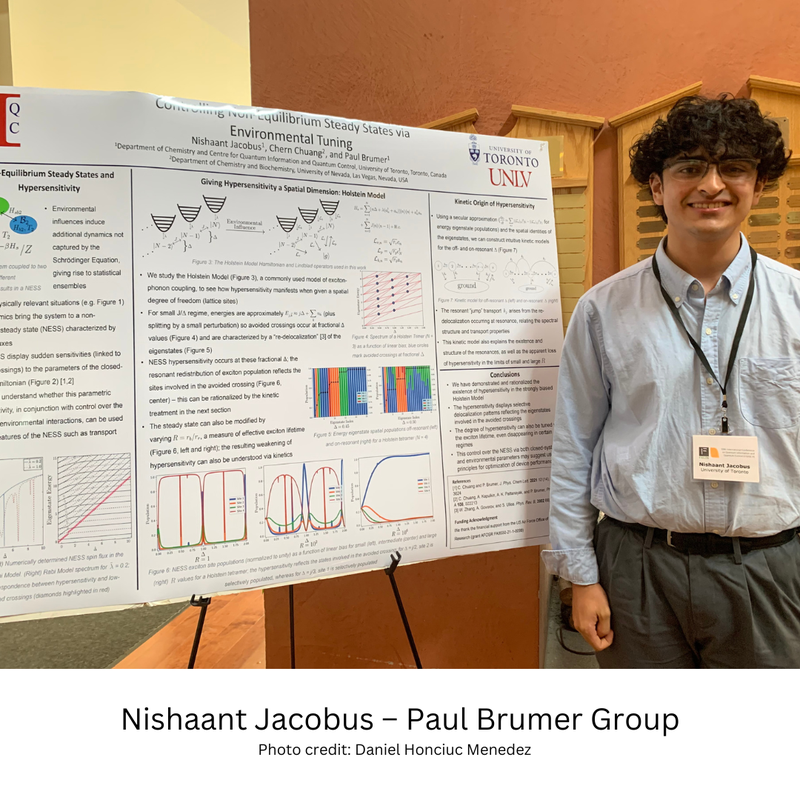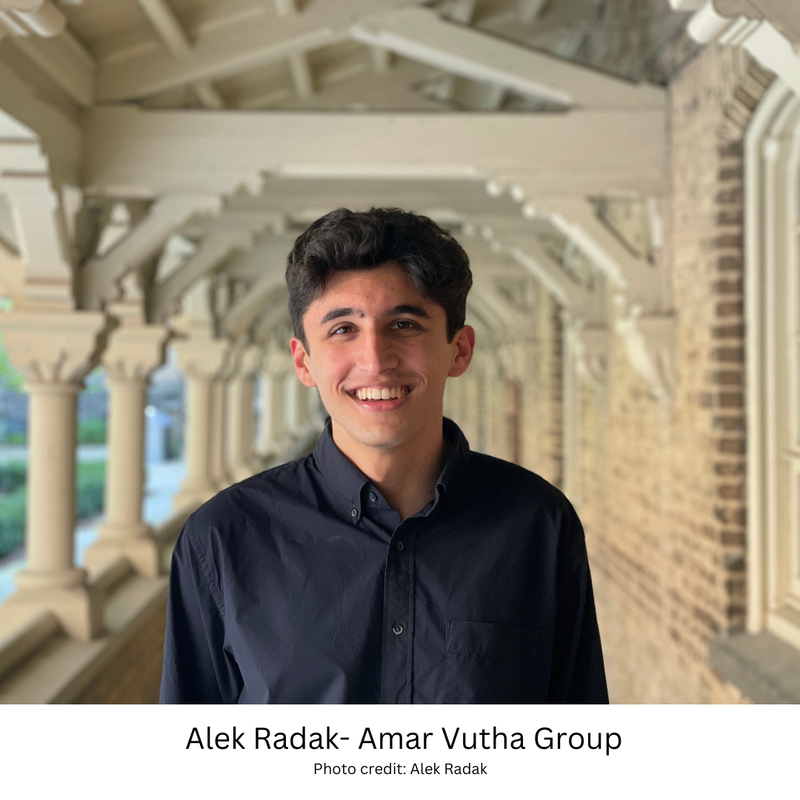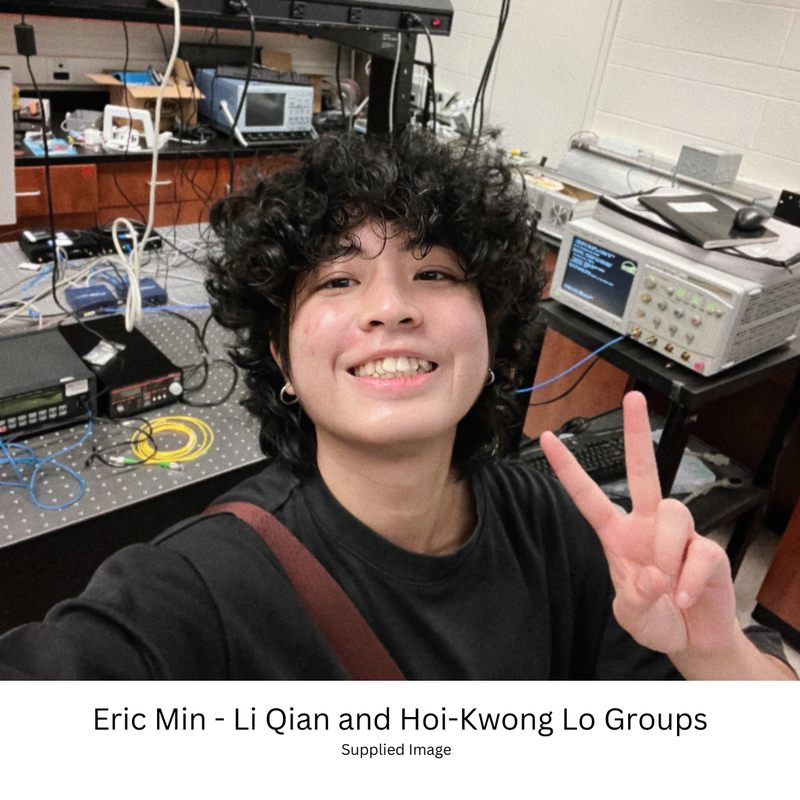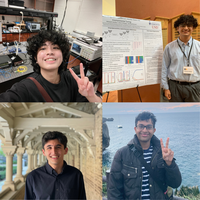The Centre for Quantum Information and Quantum Control (CQIQC) offers an enriching opportunity for undergraduate students through its Undergraduate Summer Research Program. This initiative funds students to participate in full-time research for four months with groups affiliated with the Centre. This summer, CQIQC welcomed five talented undergraduates, granting them an opportunity to engage in projects related to quantum sciences. All students shared their experiences with us, highlighting the learning and academic growth they achieved through this program.
Nishaant Jacobus, a Chemical Physics specialist and Mathematics major, worked on the project “Detecting Entanglement in Open Quantum Systems” under the supervision of Professor Paul Brumer. Nishaant investigated how entanglement manifested in mixed states—crucial for advancements in quantum information and thermodynamics: “Our group was particularly interested in how negativity, a common metric for entanglement, behaved in thermal and non-equilibrium steady states,” he explained. By analyzing model systems such as the Quantum Rabi Model, the group used “analytical and computational methods to gain insight into general features of the behaviour of negativity, then applied this understanding to study the behaviour of entanglement in a two-state two-mode model of photoisomerization reactions.” Nishaant has been actively engaged in CQIQC activities and has attended CQIQC research seminars since beginning his undergraduate studies. The activities at the Centre introduced him to different areas of research, including condensed matter, quantum computing, and open quantum systems; the latter is Professor Brumer’s field. He described this summer as “especially great” because he also presented his research at the CQIQC-X conference in August. Nishaant found the conference highly enjoyable and educational, as the detailed yet accessible talks inspired him to pursue further quantum research.

Alek Radak, a Physics specialist and Math major, was part of the project “Spectroscopy of EuYSO to Probe Physics Beyond the Standard Model” under Professor Amar Vutha. Alek’s interest in the program was prompted after hearing about it from a former participant, Harish Ramachandran. Upon learning more about the research opportunities within the Vutha group, Alek remarked, “I had to apply.” His project aimed to detect the elusive axion, a theorized dark matter particle, by measuring tiny energy shifts in a europium-doped crystal: “If the axion does exist, it would cause tiny shifts in atomic energy levels. These shifts are often too small to measure, but it turns out that by doping europium into an yttrium orthosilicate crystal, the europium becomes highly sensitive to these types of shifts. I spent my summer working on an experiment to perform precision spectroscopy on such a crystal, searching for traces of the axion.” Being part of this research was a challenging endeavor, but he overcame it with the help of experienced researchers: “Working in experimental physics is tough,” Alek noted. “I first needed to learn atomic, nuclear, and solid-state physics to even understand how the experiment worked. After that, there was a mountain of practical things to learn. I am incredibly grateful for the mentorship of Dr. Mingyu Fan and my advisor Professor Amar Vutha. They helped me to bridge this gap and enabled me to start making real contributions to the experiment.”

Electrical Engineering student Priyansh Parakh joined “Characteristics of Semiconductor Lasers under Pulsed Optical Injection” with Professor Amr Helmy. Like other students, he also learned about the summer program from previous recipients “As an Electrical Engineering student, I’ve taken courses in Electromagnetism and Optics, which sparked my interest in photonics. When I discovered the exciting research happening at CQIQC, I knew this would be a perfect opportunity to explore my passion further.” Priyansh’s participation in this program deepened his appreciation for photonics and its vast potential in quantum technology, reinforcing his aspiration to pursue graduate studies and, eventually, make contributions to this expanding field. Beyond the technical knowledge he obtained, Priyansh also acquired essential skills that would be invaluable in his future endeavors. He learned to design sophisticated simulations and tests, handle sensitive laboratory equipment, and present his research to diverse audiences effectively. The hands-on approach of the Undergraduate Research Program, proved to be enriching for him, since, as he states, the program “has not only clarified my career goals but also provided me with the tools to succeed as I move forward in both academia and the industry.”
Shravan Kruthick Sridhar, a Physics specialist and Computer Science major, engaged in two projects this summer, working first with Professor Amar Vutha on research involving an europium-doped crystal to measure energy shifts associated with the T-violation parameter in the Standard Model of particle physics, then transitioning to a simulation project under Professor Boris Braverman, which focused “on the Lattice Loading project. This simulation-based project seeks to determine the feasibility of a continuously operating atomic clock whose operation requires the cooling and trapping of atoms.” Shravan shared that the two experiments focused on precision atomic, molecular, and optical (AMO) physics, which broadened his appreciation for this field. Shravan has a clear intention to pursue a PhD in quantum optics thanks, in part, to the interaction with CQIQC researchers during the summer. Discussing the value of this program, Shravan stated: “This experience has deepened my appreciation for this field, particularly its emphasis on small-scale experiments that explore fundamental questions about the universe using atoms and light as investigative tools. Additionally, I had the opportunity to engage in discussions with experts who provided insights into the various subfields of AMO physics, guiding me in identifying my specific interests.” While he is still deciding which areas AMO physics to focus on, his long-term career goal remains clear: to conduct research in quantum optics at the graduate level.

Eric Min, a Physics Specialist minoring in Mathematics, collaborated with Professors Li Qian and Hoi-Kwong Lo in a project which “focused on evaluating the extent of phase randomisation of a commercial 2.5 GHz laser diode that would be used as a source in a passive encoding protocol for MDI QKD (measurement device independent quantum key distribution), which is a protocol designed to mitigate the source and detector side channels that were identified with the corresponding instrumentation.” In Professors Qian and Lo’s labs, Eric learned that the experiment required both stabilizing a Mach-Zehnder interferometer and devising a method to modulate the phase applied to the laser source. This was essential for the research group to observe interference fringes between two input beams at different phases and check for any correlations. Eric enthusiastically mentioned that this experience solidified his passion for optical instrumentation and sensing. When asked about the significance of the program, Eric shared that “this award was not only my foot in the door into the research world, but also allowed me to clarify my interests in the field. It wasn’t just the first-hand experience, it was also the knowledge shared in group meetings about where the field was heading.”

In 2025 CQIQC will receive a new cohort of undergraduate students. The new application cycle will commence in December 2024. For details about requirements and how to apply, visit our webpage.

